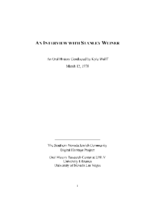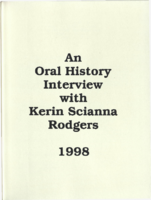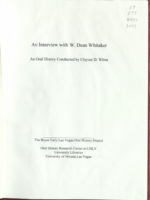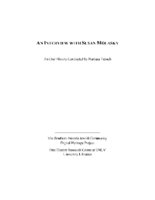Search the Special Collections and Archives Portal
Search Results

Transcript of interview with Stanley Weiner by Kyle Wolff, March 12, 1978
Date
Archival Collection
Description
Interview with Stanley Weiner by Kyle Wolff on March 12, 1978. In this interview, Weiner begins by talking about his father's employment, and then his own series of jobs, including as a department manager at Sears. He discusses living in different parts of town, population growth, educational opportunities, transportation, and recreation. The interviewer asks specific questions about sports, hotels, unions, and the weather.
Text

Transcript of interview with Leonard I. Gang and Roberta Gang by Barbara Tabach, September 14, 2016
Date
Archival Collection
Description
Leonard Gang (1935 - ) and Roberta Gang (1940 - ) are both natives of New York, though different boroughs and Jewish traditions. The couple met in 1960 while students at Cornell University and married in 1961. Two years later, Len graduated from New York University School of Law. Leonard had fallen in love with Western United States as boy on a family vacation. So when a notice was posted for a law clerk with the Supreme Court of Nevada, he knew he wanted to apply. When he presented Bobbie with a choice of Alaska or Nevada, she flatly responded that Nevada was as far west as she was willing to move. Thus, began their long and influential residencies in both Carson City and Las Vegas. In Las Vegas, Temple Beth Sholom was quickly a welcoming place to be for the Gang family. While Leonard?s law career flourished, Bobbie realized her energy and commitment to become an advocate for the benefit of the vulnerable. Over the years, she actively participated in the political campaigns of others and even entered the political arena herself, which she discusses in this oral history. During Leonard?s successful legal career, he held positions as Deputy District Attorney and Deputy Public Defender in Clark County and was in private practice. From 1971 ? 1974, he was District Court Judge in Clark County before returning fulltime to private practice. By 1988, Bobbie and Leonard had become forceful lobbyists including representing Nevada Women?s Lobby among others. In 2012, Bobbie received the Virginia Cain Progressive Award from the Washoe County Democratic Party for her leadership and dedication to the rights of others. In this oral history, the Gangs highlight their tireless efforts, the long list of political and civic leaders that they worked alongside of, some of Leonard?s high profile cases, and their Jewish heritage. They are parents of three: Lynne Moore, Karen Schnog, and Joshua Gang.
Text

Transcript of interview with Gerald Gordon by Barbara Tabach, November 02, 2016
Date
Archival Collection
Description
In 1961, at the age of thirteen, Gerald ?Jerry? Gordon became a bar mitzvah. This typical coming of age celebration was unusual in that he had simultaneously studied in both his home state of California and his adopted home of Las Vegas, where he spent summers with his grandparents. 1961 is also the same year that the Gordons made Las Vegas their permanent home. Jerry graduated from Las Vegas High School, attended University of Nevada, Las Vegas and earned his law degree from University of California, Los Angeles. His gregarious and trustworthy personality led him to career building steps in the legal community of Las Vegas that included illustrious names such as Louis Wiener, Jr., David Goldwater, Neil Galatz, and many others. His personal law specialty became bankruptcy, especially dealings with hotel/casinos. As a member of the Jewish community, Jerry?s energy and expertise to organize was instrumental in the construction of Congregation Ner Tamid, the reform synagogue, at its site on Valle Verde and I-215. It was a multi-year process and includes a vast array of stories?a cash donation from Moe Dalitz, finalization of receiving of a donation land from the Greenspun family during the High Holy Days, and the ongoing challenges of a building campaign during a recession. In addition, he explains that CNT included two unique negotiations: 1) a cell tower and 2) a solar field on the synagogue?s property. Jerry and his wife Yvonne met while attending UNLV. Yvonne taught math at various levels in the Clark County School District. They raised their two children, Sara and Jeffrey, in Las Vegas, and forged an important role together in Congregation Ner Tamid. In April 2017, they were among those honored for their work with the synagogue.
Text

Transcript of interview with Janet Garry by Elyse Rozinsky, February 24, 1979
Date
Archival Collection
Description
On February 24, 1979, collector Elyse Rozinsky interviewed file clerk, Janet Garry, (born on November 24th, 1927, in Louisiana) at her home in Bonanza Village Trailer Park in Las Vegas, Nevada. This interview covers the growth of Las Vegas from 1952 to 1979. Janet recalls the early years of the television and the telephone. She also discusses her own personal experience of raising a family in Las Vegas.
Text

Transcript of interview with John Grayson by Elizabeth Patrick, May 23, 1983
Date
Archival Collection
Description
On May 23, 1983, collector Elizabeth N. Patrick interviewed gaming professional John Grayson (born May 25, 1898 in Grayson, Missouri) at the University of Nevada, Las Vegas. The interview covers John Grayson’s experience with gaming in Arizona, California, and Nevada. Also present during John Grayson’s interview is Billy H. Gray, a longtime gaming associate of his, who helps Mr. Grayson go into greater detail about key events.
Text

Transcript of interview with Kerin Scianna Rodgers by Dennis McBride, February 24, 1998
Date
Archival Collection
Description
Kerin Rodgers owned a retail fashion store and modeling agency with a friend in Santa Monica, California. She came to Las Vegas in 1966 to work at The Broadway department store. She bought a home in the John S. Park Neighborhood in 1974. Popular radio personality; active in local and national politics.
Text

Transcript of interview with Dean Whitaker by Claytee White, April 5, 2010
Date
Archival Collection
Description
William Dean Whitaker was born in 1925 and raised in a suburb of Los Angeles, California. Dean, as he is known, talks briefly about his parents and his brothers, for his youth quickly ended when he joined the Air Force and became an aviation cadet once he had turned 18 years old. The year was 1943 and World War II was raging. He became a member of the 398 th Bomb Group and flew twenty missions before being captured by the Germans. In this oral history, Dean talks with vivid recollection of the day he was captured and details of being a POW in Germany. Among his anecdotes are those of his mother's unwavering belief that he would return home, the humanity of a German soldier, and of meeting Gen. George Patton. Included are photos and excerpts from his personal history of his life during the war. Dean and his wife Lucille moved to Las Vegas in 1990.
Text

Interview with Roger Ray, October 29, 2005
Date
Archival Collection
Description
Text

Interview with Richard Vaughn Wyman, June 13, 2005
Date
Archival Collection
Description
Access note: Audio temporarily sealed
Text

